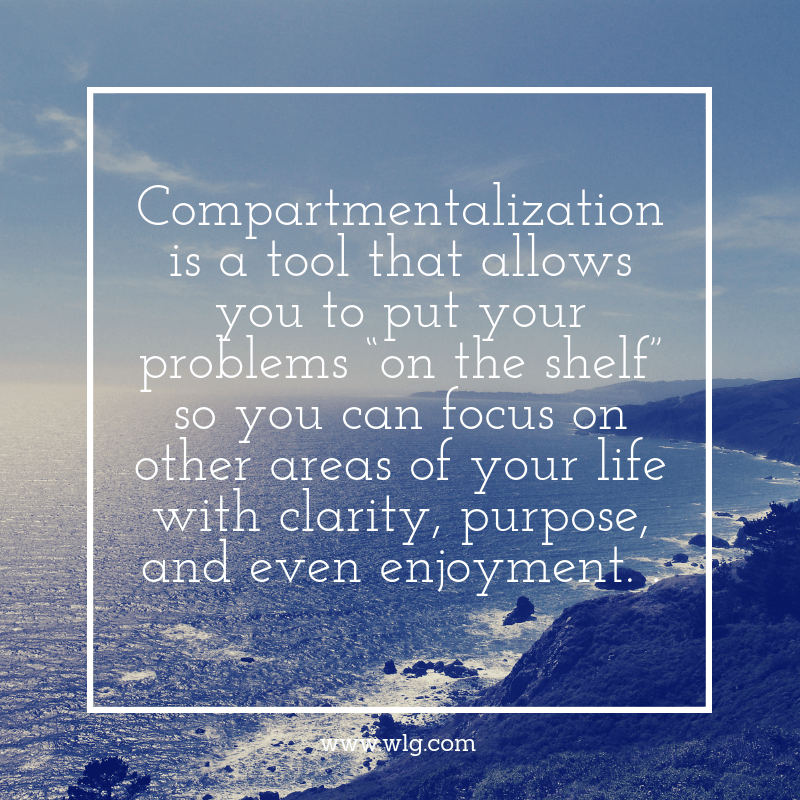Your #1 Divorce Survival Tool: Compartmentalization

Has your divorce turned you into an emotional wreck? Are you thinking about it 24/7? Are you so distraught that you have trouble sleeping, eating, and functioning in general? Then you need to learn how to divorce compartmentalization so you can cope during the process.
What is Divorce Compartmentalization?
Compartmentalization is a tool that allows you to put your problems “on the shelf” so that they don’t take over your psychological landscape. This allows you to focus on other areas of your life with clarity, purpose, and even enjoyment. When you need to work on your divorce – preparing documents, meeting with your attorney, going to mediation – you take it “off the shelf,” then put it back when your task is completed.
Healthy compartmentalization doesn’t mean that you deny your problems; you don’t want to stick your head in the sand. When used with intention, compartmentalization is simply a way of remaining mentally strong during a challenging time, such as divorce.
The 3-Step Divorce Compartmentalization Technique
- Schedule your “divorce time.”Think of your divorce as a class you’re taking in school. You’re taking other “classes” as well (job, child-rearing, self-care), so if you devote all your energy to divorce, you’re not going to do well in your other “classes.” Set aside times to concentrate on your divorce. Maybe two hours a day, preferably during daytime hours. Working at night is often a bad idea, because the negative feelings likely to emerge will keep you from sleeping properly. Having scheduled times to work on your divorce will quell your internal chaos and make you feel more in control of daunting tasks.
- Manage intrusive thoughts. The trauma of divorce can cause some people to become hypervigilant. That means you’re always waiting for the other shoe to drop. Your mind is continually scanning the environment for threats, hoping to avoid danger. This is a really unhelpful tactic. You can’t control what your ex is going to do, and being on high-alert taxes your nervous system. That means that you are likely to overreact to events because you perceive everything as earth-shatteringly terrible. When you find yourself ruminating about all the ways your ex has wronged you, or obsessing about how he or she might wrong you in the future, shift your focus back to the present. If it’s not one of your scheduled times to work on your divorce, then put divorce back on the shelf. You need to get in the habit of managing your thoughts instead of letting them manage you.
- Practice purposeful distraction. If your intrusive thoughts are persistent, and you’re struggling to think or talk about anything besides your divorce, you need to develop and implement tools to distract yourself. Distraction shouldn’t involve numbing, however. Numbing is when you eat a bag of fun-sized candy or drink a bottle of wine. These are compulsive, self-destructive behaviors that will make you feel worse when you’re done. Purposeful distraction means utilizing healthy coping strategies when you notice intrusive divorce thoughts. These strategies might include: meditation, journaling, writing a gratitude list, taking a walk, reading something inspirational, working on a craft or hobby, yoga, or any other form of exercise. Using your coping tools will help calm down your nervous system so you can put your divorce back on the shelf.
Divorce can feel intense. But that doesn’t mean you have to, or should, respond with equally intensity. In fact, having extreme reactions will just make things harder than they need to be. Practicing intentional divorce compartmentalization is one of the best ways to deal with your divorce so you can get on with your life.
Looking for a clear strategy in your divorce? We can help. For answers to all your questions about divorce and separation, child custody, child support and asset division, please contact us today to schedule your initial attorney consultation. Call us at 888-888-0919 or please click the button below.
Schedule an Initial Consultation




